There’s a secret to getting the most money in the shortest amount of time.
It’s counterintuitive, so it’s not the way most people price their homes.
Conrad 0:00
The bottom line to worth is, how much is somebody willing to pay for it?
Conrad 0:04
This is Selling Prescott, a project of PrescottRealEestate.com. I’m Conrad Walton.
Conrad 0:19
I’m going to talk about pricing your property. I can’t tell you how many phone calls I get, like, “Yeah, Hey. I’m thinking about selling my property.”
Conrad 0:27
“Oh, Hi. Yeah. I could help you with that. So do you have any questions?”
Conrad 0:31
“Yeah. How much is my house worth?”
Conrad 0:33
Well, heck, I don’t know how much your house is worth, I need to go see it. Even if I go see it, I may not know exactly what your house is worth. Because to define how much anything is worth, the bottom line to worth is: How much is somebody willing to pay for it?
Conrad 0:50
An ounce of gold? How much can you get for it today? Well, how much could you have gotten for it a year ago, it was different. People are willing to pay different amounts at different times, for different reasons, for a multitude of factors. Worth and value. It’s a very fluid kind of an idea.
Conrad 1:10
You’ve got to look at who’s buying and why are they buying. You’ve got to look at the emotions in that buying process. As much as we’d like to believe that there’s a technical explanation that there is a market, a real estate market. “How’s the market doing?” Well, it’s a it’s a seller’s market.
Conrad 1:31
And as a professional in the real estate industry, I can quote, absorption rates, price per square foot, there’s a lot of technical touch points that I can come really close on. I know, price per square foot should be $250 a square foot or 275, or two and a quarter or that part of town, it’s maybe 200. Oh, you’re in Hassyampa? Oh, we’re talking 350 a square foot.
Conrad 2:01
I mean, technically, we’re gonna do a CMA, which does not stand for “cover my ass”. It stands for Competitive or Comparable Market Analysis. We’re going to look at comps, comparable sales.
Conrad 2:18
The technical explanation is, we’re going to go pick in your neighborhood, five to 10 other homes that have sold in the last six months or a year, find some comps, figure out what’s their price per square foot? How much do they sell for? How big are they? How many square feet is it? How big is a lot? What kind of finishes are there? What other factors? Are their views? Is it at the end of a dirt road? Is it close to stores or close to schools? Or, what are all the factors involved.
Conrad 2:53
And then, to compare two houses, if one’s 50% bigger than the other, it should cost 50% more, which may or may not be true. But that’s a fact that we we put into it.
Conrad 3:06
The problem is not all houses are uniform. If every house in the universe looked identical, same size, same floor plan, it would be easy to tell you, your house is worth $386,000, boom, we’re done.
Conrad 3:22
But they’re not uniform. And the market is fluid, what it was worth six months ago, not what it’s worth today. Now what it’s going to be worth in two months from now? There’s a lot of there’s a lot of art and magic involved in coming up with a price.
Conrad 3:40
Whenever anybody asked me how much is my house worth, I always give them a range, I always give them, a here’s the bottom. And if you want to get it sold by next Tuesday, Oh my gosh, just sell it. I think we could sell it in a week for this price.
Conrad 3:56
That’s the bottom and if you want to get top dollar, here’s your top dollar price. And that’s going to be a price range. Somewhere in the middle might be good.
Conrad 4:07
Another thing to look at is the market going up or going down? If it’s going up, if it’s worth 300,000 today, maybe in two months from now it’s worth 325. I don’t really know, but you have to look at the history. You’ve got to look at the market. You’ve really got to do some research digging into numbers.
Conrad 4:28
I love statistics. I love spreadsheets, I don’t like paperwork, but I do like statistics. And I like charts and graphs because it really gives you an idea what’s going on. I can get deep in the weeds with comps and numbers and absorption rate all that stuff.
Conrad 4:45
And then I go to my to my seller, and I started to explain some of that, send him some charts send him the comps, here’s 10 houses, blah, blah, blah, and they just kind of look at me in their eyes kind of glaze over a little bit and they’re like, “Yeah. Okay, so what’s my house worth?
Conrad 5:04
And it’s like, okay, here, here’s your range, pick a number, where are you at in life? What’s your value? What do you want to do? It’s just you do the best you can, I’ll come up with a range for you, you pick the number, you may get somebody who’s got a couple million bucks,
Conrad 5:24
I had a guy, show me proof of funds, whenever they write an offer, you’ve got to have a proof of funds, or a pre qualification for a loan. Guy showed me a “pre-qual” with a $7 million bank statement. You’re gonna be able to pay more for your house.
Conrad 5:42
Yeah, probably, the guy who’s just barely scraping it together to get a “pre-qual” for, 50,000 less than your house is worth. Yeah, you’re not going to get top dollar out of that guy. Yeah, there’s a lot of factors involved.
Conrad 5:56
The market condition, that’s huge. Is it a buyer or seller market? Right now, in 2021, in Prescott, it is a “on fire, blowing up” seller’s market. Prices are going up. I would say I think the last chart I looked at, average price per square foot in prescot, which covers the whole market, a lot of houses, I think we’re at a 225 a square foot on average. And I think in the last month, we’ve hit just over 275 a square foot on average. The market is blowing up right here, right now. In another two years, who knows? It goes up and down.
Conrad 6:41
Absorption rate. Okay, this one, you could just fast forward through this. You’re not going to care or understand. Basically, what an absorption rate is, is how fast are we selling houses right now, at what rate? We sell in 10 a month, 100 a month, 50 a month.
Conrad 7:01
And then how many houses do we have for sale right now. If you have, say you have 500 houses for sale in the market, and we’re selling them at 100 houses a month, you do the math, you come up to five months worth of inventory, because you got 500, you’re selling 100 month, five months inventory.
Conrad 7:26
If you have 500 houses for sale, today, you’re selling 250, every month, you got two months of inventory. If you’d have 500 houses for sale, and you’re selling 10 per month, then you’re going to get a new job because the real estate market is dead, and you will never sell your house.
Conrad 7:48
The absorption rate is it’s expressed in months of inventory. Should be between four months and six months of inventory. That’s four or five times the monthly rate of sales, should be the number of houses that are for sale. If you’re selling 100 a month, you should have 400 to 600 houses for sale today. And it’s seasonal, it goes up and down.
Conrad 8:19
With that absorption rates really going to tell you if it’s a buyers market or a seller’s market. If you can wrap your head around that concept, that will give you a foot up in in understanding what the markets doing around you.
Conrad 8:32
The problem with absorption rate is that it’s retrospective. It’s looking in the past, it’s like, well, we sold 100 of them last month, and 95 the month before that 110 before that. But next month is May and we’re gonna sell 400 next month, you’ve got to have a little bit of magic and forecasting and a little understanding of what might probably will happen. Ask your agent about that.
Conrad 9:07
Back to pricing. A lot of times what a lot of people have said to me, and it’s really frustrating for me personally, but if I’m your listing agent, I’ll do what you say. Obedience is one of my fiduciary responsibilities. They taught me that in school, I have to do what you say. A lot of people will say, well, let’s just price it high.
Conrad 9:30
Let’s say, I want to say, I think your house is worth 400,000. And they’re like “Man, price it for 500. Let people make offers. If they want it, they’ll come make an offer and we can negotiate from there.”
Conrad 9:43
Well, then you wait, and nobody sees it. Nobody makes an offer. Now we’re two or three months into it. Not sold. We don’t have any offers.
Conrad 9:56
Now you got to drop the price, but everybody’s like “Well, why hasn’t that house sold? There must be something wrong with it.” There’s, there’s sort of a stigma for “Days On Market.” You get a lot of days on market and people are like “Meh, I don’t know. That’s not a great house.”
Conrad 10:12
And now that you’ve been on the market. People are starting to give you lowball offers, because, well, you must be desperate; desperate, because it’s been on the market for 100 days, 150 days, you’ve got to be desperate, therefore, I’m going to give you a lowball offer.
Conrad 10:29
If I think it was worth 400, and you priced it at 500, and then we drop it to 450. And now it’s three or four months in, you’re going to get an offer for 375. And that might be the only offer you get.
Conrad 10:43
Now it’s been on the market, you get a lowball offer, you finally sell it six months later, for less money than you could have sold it for five months ago.
Conrad 10:55
That’s what happens when you price it too high. People are not going to look at and… See, you’ve got to think “Who’s your buyer?” Your buyer is sitting in their underwear, 11 o’clock at night, all lights are out, except for their computer’s on, and they’re skimming through Zillow, and they’re doing searches in Zillow. And they’re looking at this, and they’re looking at that, and they’re doing search by price, and they’re looking at maps.
Conrad 11:20
And, if they’re looking at a $350 to $450 price, you’ve priced it at $500, you’re not going to show up in their list. They’re never even going to see you. They’re not even going to be aware of you to make an offer. You’ve got to price it low enough to get that guy’s attention. If they look at and go, “Oh my gosh,! This is 450! That’s right at the top of my budget, I can buy that. Okay, let’s go make an offer.” They are, they go look at it.
Conrad 11:26
What the right way to do this is, you’ve got to get people interested, you’ve got to get them attracted to you.
Conrad 11:59
It’s kind of like dating. it’s like you look across the room, you look into her eyes. And, there’s that magic moment they fall in love. And from then a guy will talk himself into anything after that moment.
Conrad 12:15
You’ve got to get them hooked on the price to begin with up front. Give them a nice medium price. Because they’ll figure that they can lowball you later, we’ll get to that in a minute. That gets them out to the house, they open the car door, they look at the house, they fall in love. That’s looking across the room and catching their eye.
Conrad 12:36
They fall in love with the house at that moment, the opening the door moment is the most critical moment in the entire sales process.
Conrad 12:45
Now, they love the flowers, they love the curb appeal, they walk up to the house, they open the front door, and they look inside. Second most important moment in the real estate sales process.
Conrad 13:00
Now they’re in love. Now they got their emotions all stirred up. They’re going to talk themselves into this. They’re going to justify everything. They’re going to figure out a way to talk themselves into it. Because “Oh, my gosh! I love this house.”
Conrad 13:15
Once you’ve got that hook set in them, the sales done, nothing else will change that they love that house. Then they come back and they’re like, okay, we want to, we want to write an offer. They write an offer for 25,000 less or whatever.
Conrad 13:33
That’s when you need your real estate agent to say, “No.” They’re like, “Oh, no. Well, but I love the house. Can I afford the extra money?” and their little brain is just running as fast as they can to justify that extra money. But they love the house, so they come back in.
Conrad 13:53
“Okay. All right, fine, we’ll give you the full price offer.” Boom, we have a full price offer. We’re two weeks into the sales price or sales process. we’ve been on the market for a couple of weeks. This guy’s in love and they accept the full price offer.
Conrad 14:09
He, you go into escrow. You close the deal. If things come up in the inspection or whatever. They’re still in love. “Oh, the roof is shot. We need a new roof.” “Yeah. No. I’m not giving you 15 grand for a new roof. No.”
Conrad 14:23
And they say “Okay, okay.” and they justify it in their head again.
Conrad 14:27
The trick is give it a nice mid range price to get them hooked. To get them out there to get them to come look at your house. Once they get out of the car. Once they walk in the front door and they love your house.
Conrad 14:43
Then you’ve got them and you can grind them as hard as you want after that, because they will give you everything that you asked, for in order to get that house that they love.
Conrad 14:55
Most important thing on picking a price is pick the right price. For you, for the market, for your buyer. And then, and this is critical, because you’re not going to want to do this, do not come down in price.
Conrad 15:09
If you can get them in love, do not come down in price. Don’t play that, “Oh. Make me an offer and we’ll negotiate later.” game. meet you halfway, blah, blah, blah. No. You’re just gonna lose money on that.
Conrad 15:20
Give them a decent price up front, a good enough price to hook them. And then stick with that. And then on the back end, tell them no, no, no, no, no, we’re not giving you anything else. And you’re gonna, you’re gonna get the best deal.
Conrad 15:35
You got to be “nice”, “nice”, “hard”. you’ve got to be “Jab”, “Jab”, “Jab”, “Punch”. That’s the way you’re going to get the highest price in the shortest time.
Conrad 15:45
And that is the best secret to selling your house that I could possibly give you.
Conrad 15:51
Price it accurately. Get a real estate agent to run those comps. Run the CMA. Do all the technical background, do all the technical homework, get your agent to do that. They’re better at it than than you are. Come up with a reasonable price.
Conrad 16:08
See what that that gap is, unless you really want to grind them on the highest price and you’re willing to wait six months, you could do that if you want. And that may get you a higher price, but it’s going to take longer, and you may not get a higher price. That’s kind of dicey. But you can roll those dice if you want.
Conrad 16:27
If you need to, “Oh my gosh, get this thing sold right now.”, then instead of a mid range price go on the lower end. And I could sell it by next Tuesday at a lower price. That’s, that’s the quick and dirty.
Conrad 16:40
The market we’ve got right now in prescot is blowing up. If you come in with a lower price, seriously, sold by Tuesday. I should trademark that, because that’s what’s going to happen.
Conrad 16:53
The last listings I’ve done in the last couple months, and I’m recording this at the beginning of 2021. We’re just getting into spring, the last couple sales in my little area out here, have gone for more than they were asking for.
Conrad 17:10
The last house I listed, I thought, here’s the price I think it’s worth. Here’s kind of the top end, I think I can sell it for this number, it’s a good number. And then we added another like 15 grand on that because, Hey, it’s the market. See what happens.
Conrad 17:26
Got two showings in the first four days. I think we priced it right. In this market right now, in Prescott, it’s blowing up, add 25 grand to it. Who knows what will happen? You just might get it.
Conrad 17:42
That’s my spiel on pricing your property. I feel very strongly about all of that.
Conrad 17:48
If you have questions, let me know. Give me a call and ask me.
Conrad 17:52
“Hey, Conrad, how much is my house worth?”
Conrad 17:54
Thanks for listening. Please drop a review wherever you get your podcasts. If you have any questions or need any help with real estate in Prescott, please give me a call or text me at 928-925-4428. You can email me at Conrad at PrescottRealEstate.com. You can always contact me through the website where you can also get show notes with information about this episode. That’s PrescottRealEstate.com.
Conrad 18:22
The key to life is gratitude, so stay thankful
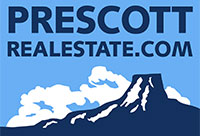
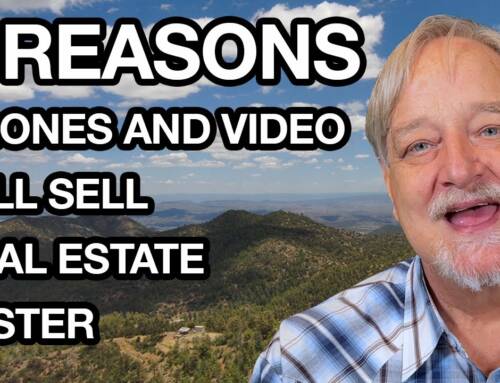
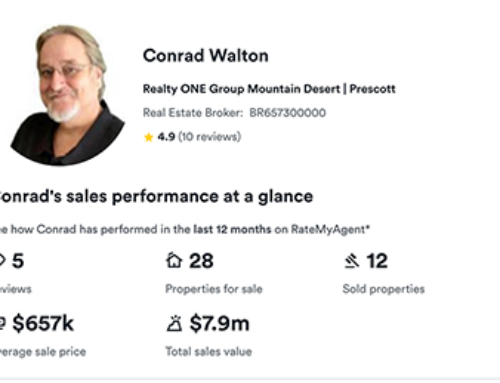
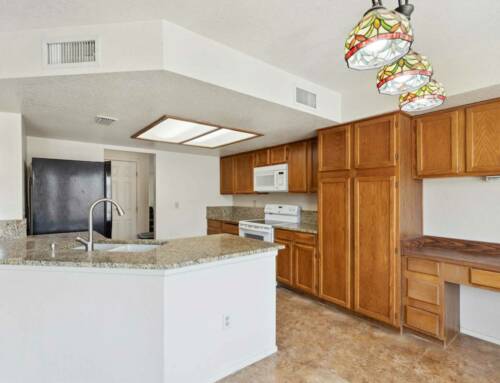


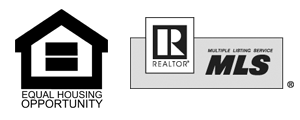
Leave A Comment